Two Feet of Love in Action at the Border
BY LIZZIE HUDSON | September 19, 2018
When I was in fourth grade, I learned about immigration for the first time. I remember my teacher telling us about Ellis Island and all the people that came into our country looking for a better life.
She spoke about European immigrants as a simple matter of fact. Then she used a term that I will never forget: illegal alien. She used it to describe people who crossed the U.S.-Mexico border illegally. My ten-year-old self didn’t understand why she would use positive sounding words for one group of immigrants but not for the other.
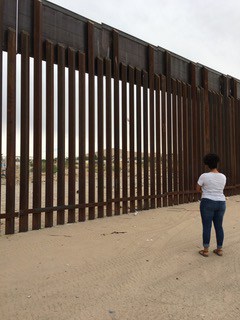
An 18-foot border wall in Sunland Park, New Mexico, built near the end of the Obama Administration.
Fast forward to this past summer, to the days leading up to my border awareness trip with the Columban Mission Center in El Paso, as I was trying to figure out how I felt about going.
Was I nervous? No.
Was I excited? That didn’t quite describe my feelings.
I was just ready—ready to start the journey. This would be my first time on the border. I had only seen what it was like through the news and textbooks. I knew that I would be meeting immigrants who had just made it to the United States. While listening to their stories, I expected I would have to hold back tears. I couldn’t have been more wrong.
During one of the days, my group was asked to cook a meal for the guests staying at Annunciation House, a local shelter for migrants. We decided to make enough eggplant and chicken parmesan (and watermelon for dessert) for forty people. We chopped vegetables, tenderized chicken, and sliced bread for hours.
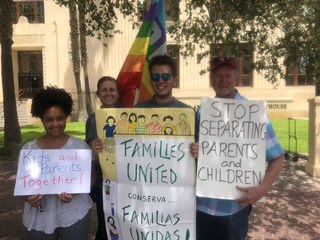
At the El Paso courthouse protesting family separation at the U.S.-Mexico border.
Even with my whole group working on this task, I was tired when we finished. But then our guests started to arrive. We greeted everyone in broken Spanish. Once everyone got their food and sat down, I was immediately drawn to a table with children.
I love kids, and I have a niece back home who I was missing. Sitting at the table was their mother, a teenage girl, and Jorge, who is the same age as me. I don’t speak much Spanish and they didn’t speak much English. But instead awkward silences I expected, the girls and I ended up making goofy faces at each other.
We went back and forth seeing who could cross their eyes and touch their tongue to their nose. They were very good at crossing their eyes! I noticed that one of the girls had the Disney princess Anna on her shirt. I showed them the Disney emoji app on my phone, and then we started imitating all of the silly faces the emojis were making.
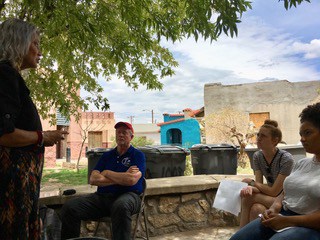
At the farm workers center in El Paso, learning about the harsh working conditions experienced by farm workers on a daily basis.
While the girls were occupied with the Disney app, Fr. Bob (a Columban priest and the Director of the Columban Mission Center) came over to the table and started talking to their mother in Spanish. I tried to listen to their conversation but the youngest girl kept tapping my face so I would pay attention to her. I gladly obliged. We continued to make faces and laugh together until they left to return to Annunciation House.
Now it was just me, Fr. Bob, and Jorge at the table. As Fr. Bob and Jorge started talking, he shared with us why he left his home in El Salvador. Jorge is an openly gay man. When he came out to his father, his father disowned him. His father literally removed his last name from Jorge’s name.
Without his family anymore, it was just Jorge and his boyfriend. They received death threats and were victims of violence, just for being in a relationship. One of their gay friends was beheaded. So they made the decision to flee together.
When they arrived at the U.S. border, they applied for asylum and were put in detention. In the detention center, the other migrants harassed Jorge and his boyfriend. They asked the guards for help but they turned a blind eye. He told us that he had thoughts of taking his own life because of all the pain he’d suffered.
After eight months in detention, Jorge was granted asylum. Unfortunately, his boyfriend is still inside.
When Jorge told us all this, I asked Fr. Bob to translate for me: “I’m glad you’re still here.” Fr. Bob asked him how is it that he’s able to share his story with such courage and openness. Jorge said that it’s simply by the grace of God, and that whenever he feels like crying he dances instead. Fr. Bob asked him what his favorite type of dance music is (bachata), then put some on. Jorge asked me if I would dance with him. Everyone else from my group joined in the dancing too.
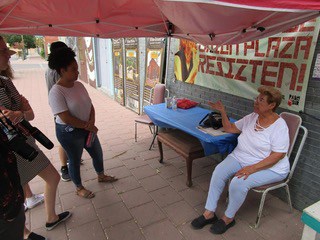
Speaking with residents of the neighborhood of Duranguito about their efforts to combat neighborhood destruction to build a brand new baseball stadium.
As an advocate, it’s easy for me to get caught up in the process of passing bills or organizing rallies in order to make a systemic change. But being immersed in a border community like El Paso and forming relationships with individuals made me realize that I can forget about how there are people who need help right now.
Though I like to focus my energies on working for social justice, during my time at the border I was able to focus on charitable works. I met a lot of people there who weren’t as focused on systemic change as I am. They just want to be looked at as a human being, to have somewhere to eat and sleep.
El Paso opened my eyes to the importance of balance, that social justice and charitable works go together. Many people call this the “two feet of love in action.” So my goal for this fall semester back in Omaha is to make sure I’m walking with two feet, not one.
To learn more about the border and how you can stand in solidarity with your sisters and brothers who live there, consider signing up to receive a free copy of the Columban Center’s “Border Solidarity Toolkit.” It includes a number of activities for prayer, education, and action then can help you walk with both feet of love.
Lizzie Hudson was the Environmental Justice Intern for the Columban Center for Advocacy and Outreach in the summer of 2018. She attends Creighton University, where she is studying sociology and philosophy. After graduation, Lizzie plans to go into advocacy full time—hopefully in the realms of racial justice, immigration, environmental justice or somehow a mixture of all three!


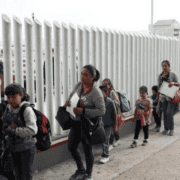
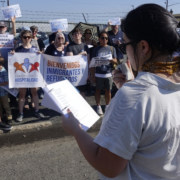


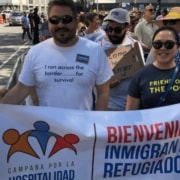
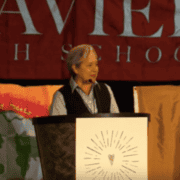
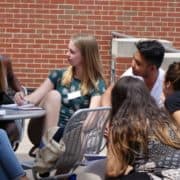



Leave a Reply
Want to join the discussion?Feel free to contribute!